'If our troops on the frontlines were sleeping for two hours, they can perhaps now sleep for 2.5 hours because when the adversary is right in front, then you can't even blink your eyes, you have to be absolutely alert.'
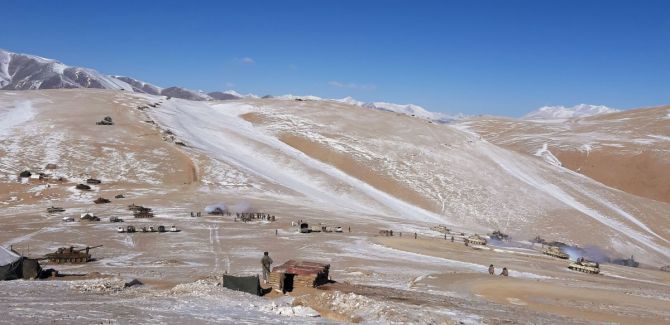
"The Chinese, even if they pull back 100-150 kilometres behind, it will not be difficult for them to come back. Wth the kind of infrastructure they have, they can return into the areas in about six to eight hours," warns Lieutenant General Sanjay Kulkarni PVSM, AVSM, SC, SM, VSM (retd).
General Kulkarni commanded a brigade and a division on the Line of Actual Control.
In the concluding part of his interview with Rediff.com's Archana Masih, the general discussed why it is important to remain vigilant even after the disengagement with China.
What do you think of the disengagement and the way ahead?
It is a win-win situation where tensions have gone down and hopefully we will also get to know the Chinese intent, especially in Depsang.
There have been incidents in Depsang in 2002 and 2013. Then PM Dr Manmohan Singh's government signed the border defence corporation agreement to maintain peace and tranquillity. Despite that, the PLA obstructed our patrolling at some points.
Depsang is not like other features. It is a high altitude desert plateau where you can see for miles and can spot anything that moves.
The altitude may be 16,000 feet, but the ground is absolutely plain which makes it easy to see the movement of equipment and troops, including tanks.
The Karakoram Pass is accepted by both India and China as the delineating point, which is not very far from Depsang or Daulat Beg Oldie.
Looking at the progress of phase 1, if the Chinese continue to walk the talk in other phases -- then Hot Springs, Bogra, Depsang will also get resolved.
Can the breach of trust between the two countries ever be bridged?
It will not be easy to fill the big crack that has developed in India-China relations. Our relations had been progressing, but we have gone back drastically on that road.
India and China are members of various world organisations where they are bound to be meeting each another. It would be something like the Indian and Pakistan prime ministers not meeting each other in international forums.
Our prime minister invested a lot of his time and energy in building good relations and instead of reciprocating, the Chinese backstabbed us.
The Chinese have learned the art of exploiting the system. They have deep pockets so we have to be wary, cautious, vigilant. We cannot take things for granted.
There cannot be any complacency and we should be alert. We cannot be carried away by a smokescreen or a tactical retreat.
We will have to be careful, not only now, but for years on. We have to be careful and very vigilant.
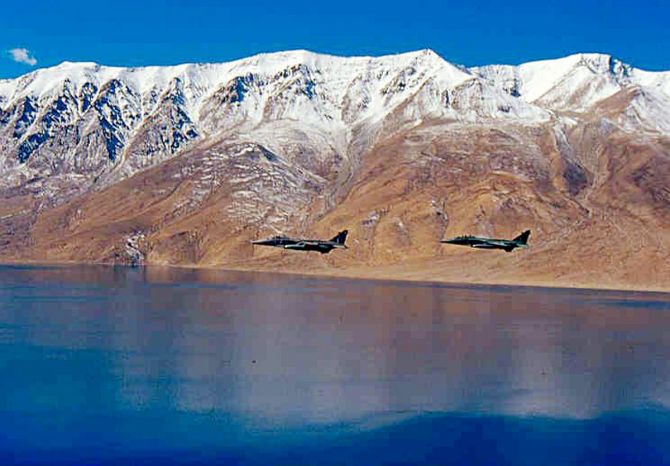
When you say we have to remain vigilant, does it mean that our troop deployment has to remain as it has in the last few months?
The Chinese have pulled back because they had moved forward from their mobilisation areas or their perception lines, whatever they may be.
Indians troops are on the Line of Actual Control and have not gone into the Chinese area, neither have we ventured into no man's land or the no patrolling zones.
The Chinese backstabbed us. They violated all agreements and therefore, the Chinese, even if they pull back from eyeball-to-eyeball position to 100-150 kilometres behind, it will not be difficult for them to come back with the kind of infrastructure they have. They can come back into the areas in about six to eight hours.
Hence, we have to be very, very careful.
If our troops on the frontlines were sleeping for two hours, they can perhaps now sleep for 2.5 hours because when the adversary is right in front, then you can't even blink your eyes, you have to be absolutely alert.
This disengagement has provided a slight breather.
What is the best way to deal with China hereon?
Our standard of vigilance will see us through for the next 50 years.
We must remember that we have to always deal with China from a position of strength. Appeasement is misunderstood in Chinese culture. China respects America because they see them as a strong nation.
Similarly, the Galwan incident revealed India's raw courage.
We lost 20 men and they lost 45. It instilled fear into them. If we had not confronted them, they would have thought we are weak.
Not a shot was fired, but the message was conveyed.
The Chinese must have realised that Indian soldiers are not what they were in 1962.
Overall, disengagement is a win-win situation, but we should continue to be vigilant and not get complacent. No appeasement with China, in fact, it must remain a matter of fact relationship.
China shares its borders with 14 countries -- they have delineated boundaries with 12 of those countries, the only two countries they haven't settled boundaries with are India and Bhutan.
Until and unless we demarcate boundaries, the problem will remain. We haven't exchanged maps and our understanding of the boundary is perception based.
We have reached a level where China can't be trusted.
Feature Presentation: Aslam Hunani/Rediff.com









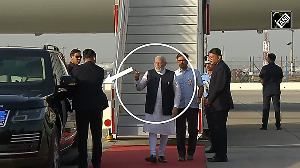
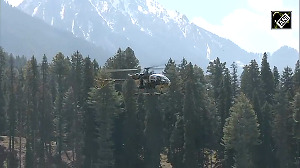
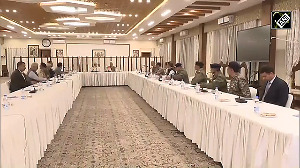
 © 2025
© 2025